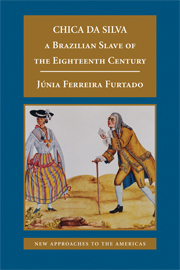Book contents
- Frontmatter
- Contents
- Acknowledgments
- Preface
- Maps
- Introduction to the English Edition
- 1 Land of Stars
- 2 Chica da Silva
- 3 The Diamond Contractors
- 4 Black Diamond
- 5 The Lady of Tejuco
- 6 Life in the Village
- 7 Mines of Splendor
- 8 Separation
- 9 Disputes
- 10 Destinies
- 11 Chica-que-manda
- Abbreviations
- Suggested Reading
- Index
- Plate section
7 - Mines of Splendor
Published online by Cambridge University Press: 05 September 2014
- Frontmatter
- Contents
- Acknowledgments
- Preface
- Maps
- Introduction to the English Edition
- 1 Land of Stars
- 2 Chica da Silva
- 3 The Diamond Contractors
- 4 Black Diamond
- 5 The Lady of Tejuco
- 6 Life in the Village
- 7 Mines of Splendor
- 8 Separation
- 9 Disputes
- 10 Destinies
- 11 Chica-que-manda
- Abbreviations
- Suggested Reading
- Index
- Plate section
Summary
Ah, such swollen rivers,
and mountains so high!
Ah, such biting whips,
Such golden chapels!
Ah, such haughty manners,
And decisions so false …
Ah, such happy dreams …
Such miserable lives!
THE PATRON
In 1753, when Chica da Silva and Francisca Pires appeared before the ecclesiastical visit in Tejuco to sign their admission to the crime of concubinage with Manuel Pires Sardinha, “as neither knew how to write, the reverend inquisitor signed on their behalf.” Chica, like most of the slaves scattered throughout Brazil, was illiterate. Nevertheless, during her relationship with João Fernandes de Oliveira, she had access to a refined culture and was before long a lady “occupied with the service of her house [and] living off her slaves.” The chief judge was a cultured man, educated at Coimbra and possessed of a refined musical and theatrical taste. Chica started to attend the soirées, plays, and musical recitals he promoted, especially the operas, the preferred style of the day. She also received some formal education, which at least enabled her to sign her own name and distance herself from her past of enslavement and illiteracy.
The following annotation can be found on various papers registering her daughters' movements to and from Macaúbas nunnery: “So signed she, [Francisca da Silva de Oliveira], the mother of the charge,” is incontrovertible proof that she possessed this ability.
- Type
- Chapter
- Information
- Chica da SilvaA Brazilian Slave of the Eighteenth Century, pp. 193 - 210Publisher: Cambridge University PressPrint publication year: 2008

